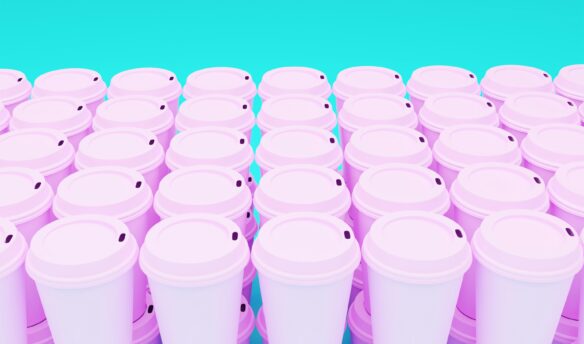Tariff tensions resurface as Trump threatens a 50% increase on the world’s largest producer of coffee. Plus, farmers are planting more coffee trees in a bid to increase production, and history is made at the Honduran Cup of Excellence competition.
‘Trump’s Brazil Tariff Rattles Coffee Market, Could Raise Prices in US’ – via Reuters
Coffee commodity prices have been falling in recent months, driven by reports of better harvests. But they jumped again this week after U.S. President Donald Trump threatened to impose 50% tariffs on imports from Brazil.
In a letter to Brazilian president Luiz Inácio Lula da Silva posted on social media on July 9, Trump threatened to impose tariffs against the country in part due to what he called a “witch hunt” against former president Jair Bolsonaro. The right-wing, Trump-supporting Bolsonaro is on trial for attempting to overturn Brazil’s presidential election loss in 2022, something that Trump called “an international disgrace.”
In a statement given to AP News, Lula said that Brazil would respond by imposing its own tariffs. “Brazil is a sovereign country with independent institutions that will not accept being taken for granted by anyone.”
According to the Financial Times, arabica coffee prices jumped 3.5% the day after Trump’s announcement.
Brazil is the world’s largest coffee producer, and the U.S. is its biggest buyer, importing more than $2 billion worth of coffee over the past year. A 50% tariff on Brazilian coffee will impact almost every importer and roaster in the U.S. Reporting from Marcelo Teixeira and Maytaal Angel of Reuters suggests the tariffs could severely disrupt, if not completely pause, shipments of coffee from Brazil to the U.S.
Coffee broker Michael Nugent told Reuters that “a tariff of this size would all but shut down” the coffee trade between the two countries. “Brazilian exporters won’t absorb it. U.S. roasters can’t,” he said, noting that both countries will need to look for alternatives. “Bottom line: Brazil will sell its coffee elsewhere. The U.S. will buy coffee from someone else – Colombia, Honduras, Peru, Vietnam – but not at Brazil’s volume or price,” Nugent said.
U.S. coffee companies have already started to raise prices in response to the earlier round of tariffs that went into effect in April.
In addition, Trump mused in a call with NBC on July 10 that the blanket 10% tariffs he initially proposed against nearly every trade partner may rise to 15% or 20%. The National Coffee Association has—unsuccessfully—been pushing for coffee to be exempt from tariffs.
Read more on the latest tariff fallout here.
‘New Coffee Farms May Bolster Global Supply Shortage’ – via Sprudge
As global coffee demand continues to grow, production has struggled to keep up. Along with rising demand, coffee production has oscillated over the last few years as farms have been impacted by climate change. Extreme weather—including droughts in Brazil and Vietnam—has caused years of supply deficits and driven up coffee prices.
However, higher prices have encouraged farmers to plant more coffee, according to Vanusia Nogueira, the executive director of the International Coffee Organization (ICO). More coffee plants will bolster supply—but not for a few years. “These are plantations that will start producing in about three years, so then, in three years, we should have some additional supply,” Nogueira said at an event in Brazil.
Nogueira anticipates that 2026 may bring an end to several years of coffee deficits, where demand outstrips supply worldwide. However, she noted that it depends on whether climate change and erratic weather patterns continue to impact coffee production.
Data from the financial services company StoneX, reported on by Dayanne Sousa for Bloomberg, shows that Brazil has planted 300 million new robusta seedlings in 2025. Once they start producing, these trees should boost production by two million 60 kg bags, or over 250 million pounds of green coffee.
Where the land is coming from for these new plantings isn’t clear. Deforestation remains an issue in coffee production—nearly two million hectares of forest were replaced by coffee between 2001 and 2015, according to the World Resources Initiative’s Global Forest Review. At the same time, the European Union’s incoming deforestation regulation continues to face pushback from large companies.
Read the full story on expanding coffee production here.
‘Honduras Achieves Cup of Excellence World-First’ – via Global Coffee Report
Because of the way the coffee industry is structured, with rich consuming nations buying from often poor producing countries, most farmers export their best coffee in order to earn the most money. Many specialty farmers have never even tasted their own coffees.
The same often happens at Cup of Excellence, a coffee competition held in over a dozen coffee-producing countries to find the country’s best coffees. The winning lots at a country’s Cup of Excellence green coffee competition are usually scooped up by deep-pocketed roasters. For example, an American roaster bought the 2024 Ethiopia CoE-winning coffee during the auction held after the competition for a record-breaking $445 per pound.
However, this year’s CoE competition in Honduras was different, reflecting the recent push to increase domestic consumption in producing countries. At the auction for the winning coffees, the top two lots were purchased by a Honduran company, Spirit Animal Coffee, which plans to roast and serve them to a local audience. It is the first time in CoE’s history that a company based in the hosting country has won auctions for both first and second-place lots.
“This is a powerful moment for Honduras,” said CoE managing director Gary Urrutia. “For the first time, people in Honduras will be able to experience the absolute best of their own coffee.”
Urrutia noted that a country’s winning coffees are usually exported. “Keeping them here is a turning point for how coffee-producing countries reclaim pride, ownership, and recognition in the global market.”
Read more about the award-winning Honduran coffees here.
More News
‘Watch Out, Starbucks: China’s Biggest Coffee Chain Opens Its First US Locations‘ – via CNN
‘Coffee Maker Lavazza Calls for Further Delay to EU Deforestation Law‘ – via Reuters
‘For Brazil’s Criminals, Coffee Beans Are the Target‘ – via Bloomberg
‘Coffee Roaster Rallies Community for Flood Relief‘ – via Global Coffee Report
‘Colombia Declares Coffee as National Beverage’ – via Colombia One
‘Starbucks China Attracts Bids Valuing the Coffee Chain at up to $10 Billion, Sources Say‘ – via CNBC
Is Coffee Good For You?
Drinking coffee every day could reduce your risk of developing type 2 diabetes, according to a new literature review from Korea.
Researchers looked at data from nearly 150 studies and concluded that consuming three to five cups of black coffee per day could lower your risk of developing type 2 diabetes by between 20-30%.
For the study, published in The International Journal of Molecular Sciences, the researchers focused on bioactive compounds found in coffee, including polyphenols like chlorogenic acid, and their impact on the small intestines, pancreas, liver, muscle, and tissue.
They found that the compounds enhanced insulin sensitivity, regulated blood sugar levels, suppressed inflammation, and improved glucose metabolism, among other effects. “Coffee and its bioactive compounds … have significant potential in the prevention and management of [type 2 diabetes],” the authors wrote.
However, they cautioned that many of the studies used were conducted in lab settings or using animal models and may not reflect the complexity of diabetes in humans. This wide variability in approaches “further complicates the interpretation and generalization of the findings,” they wrote. “Nevertheless, these preclinical studies provide critical insights into underlying mechanisms and serve as an essential foundation for guiding future clinical research.”
Beyond the Headlines
‘The Possibility And Promise Of Community Supported Agriculture In Coffee’ by Marco Dregni
‘Cannabis Coffee Shops Give New Meaning to Third Places’ by Chloé Skye Weiser
‘The Movie-Magic World Of Coffee As A Screen Prop’ by Jenn Chen






